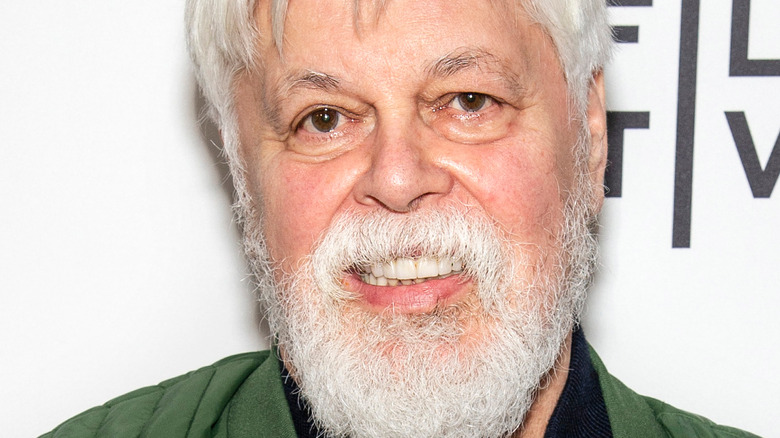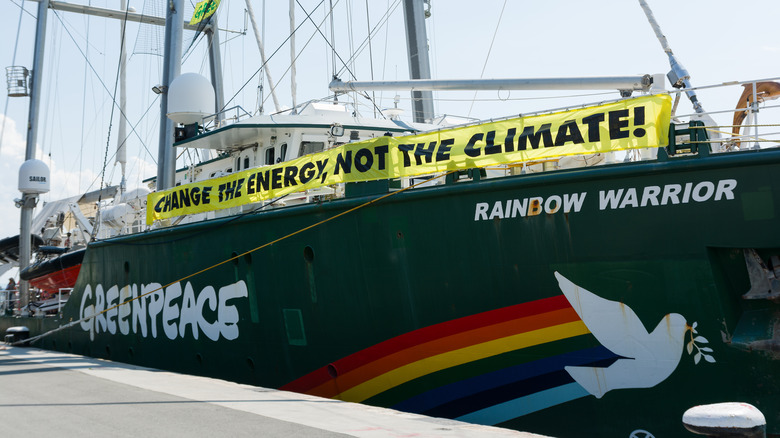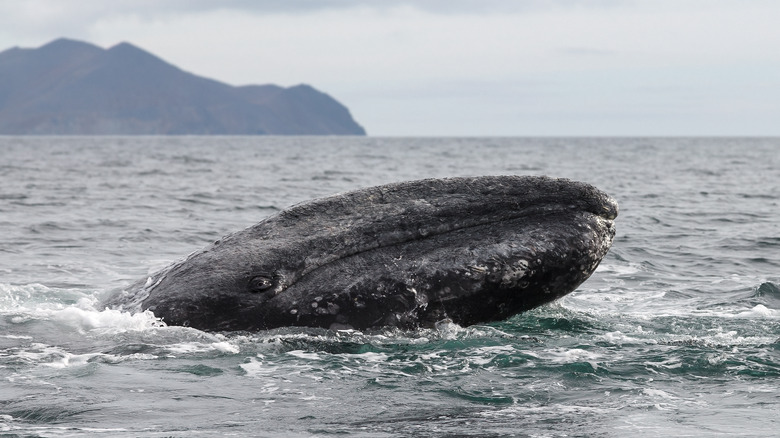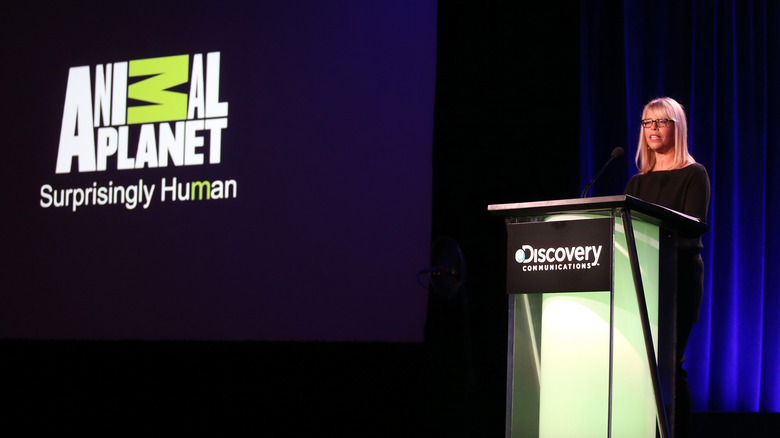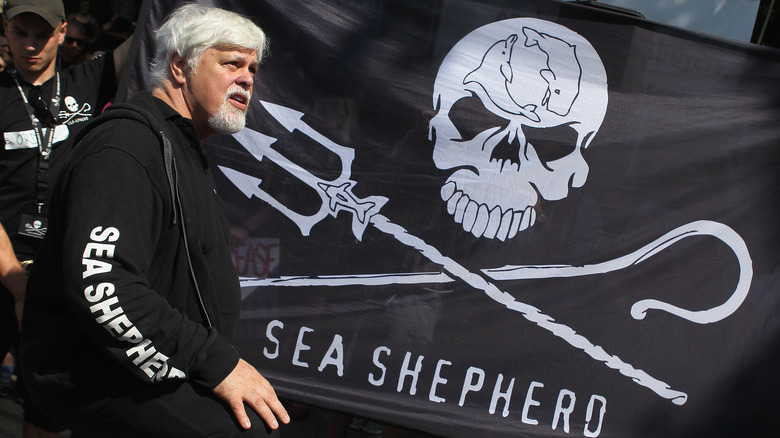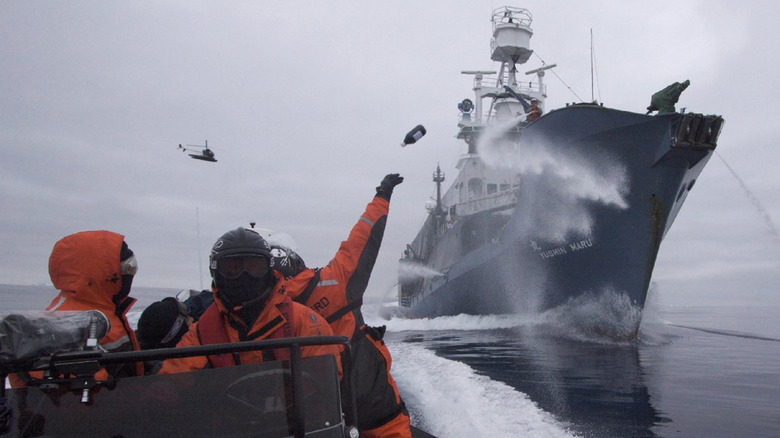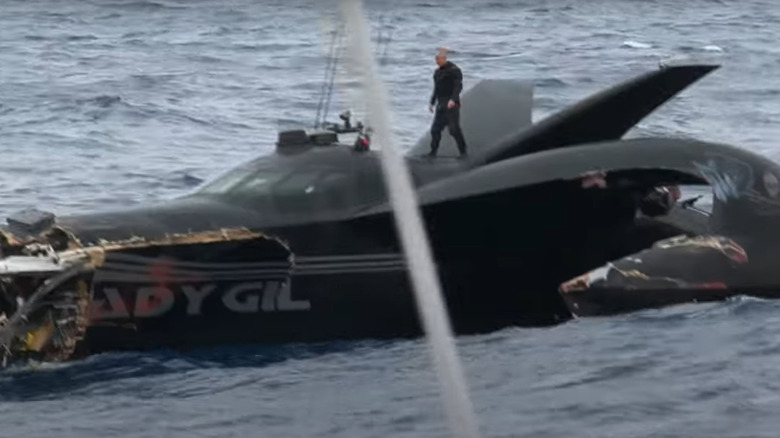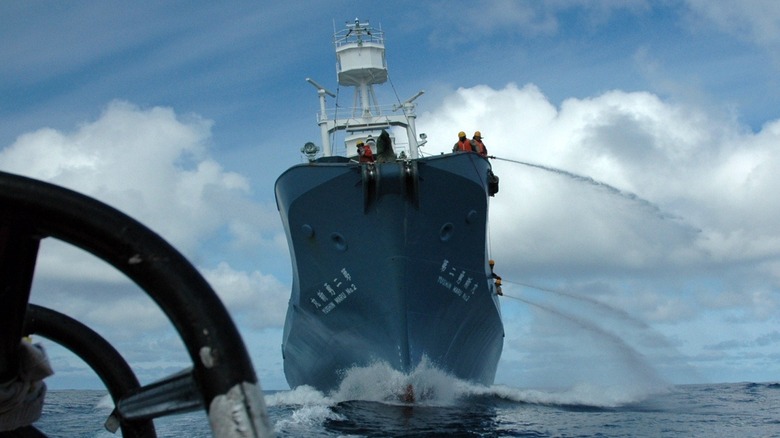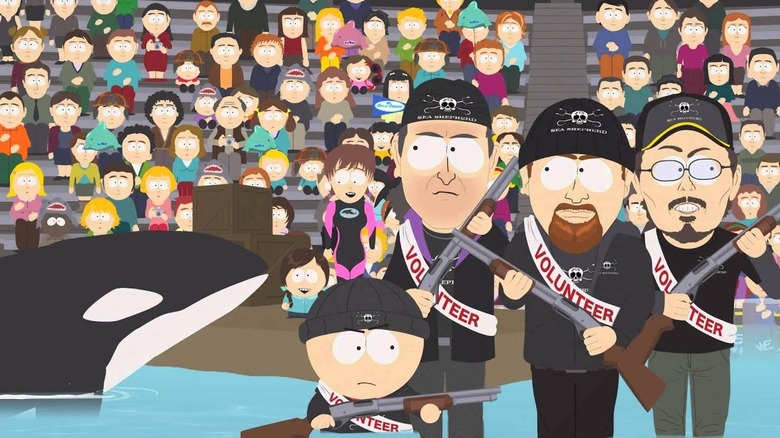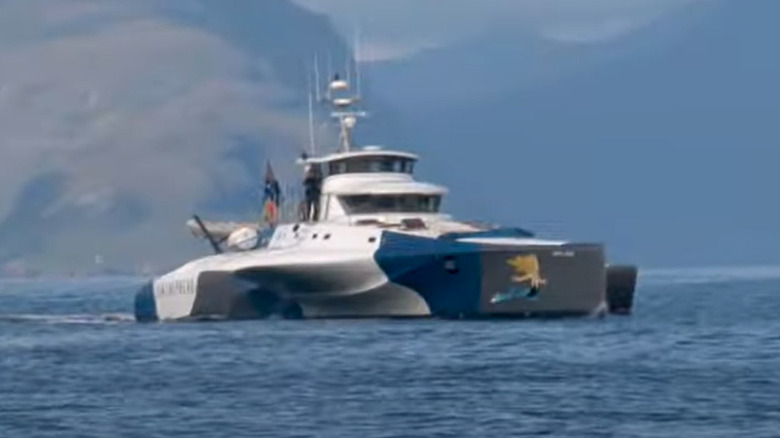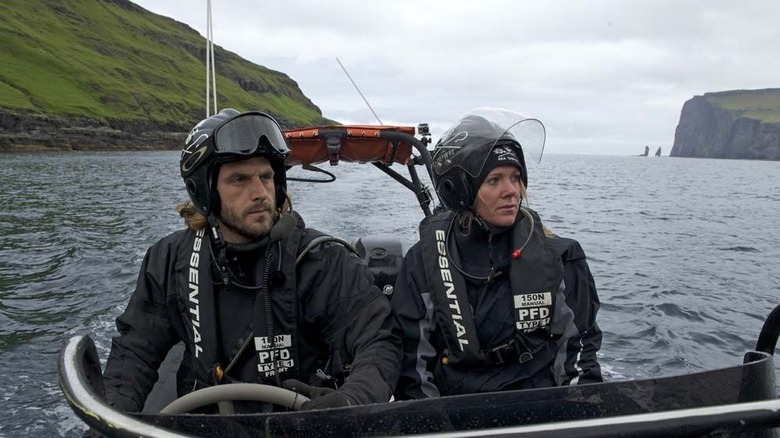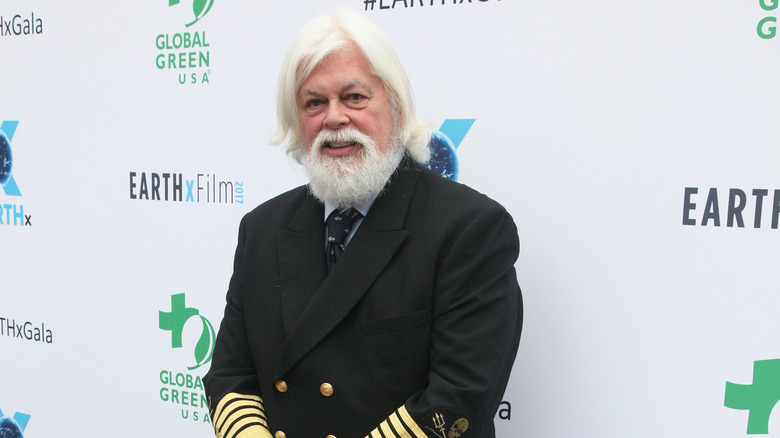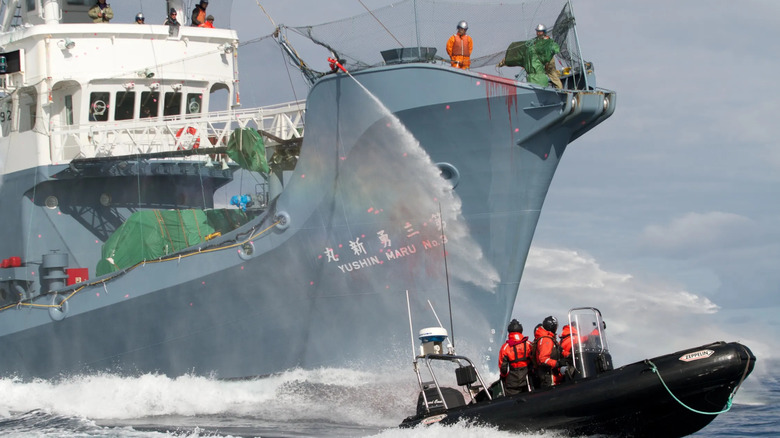Whale Wars Facts Only Major Fans Of The Show Will Know
The "Whale Wars" reality series featured on Animal Planet certainly sparked a fair share of controversy, which may have put off some viewers. Love it or hate it, there is no denying that the show is unique for being the primary video representation of the Sea Shepherd Conservation Society. The activists of this organization carry out the extremely noble act of preventing the slaughter of thousands of whales on the open seas, regardless of the danger of doing so.
Many people, including some with powerful positions in various governments, have been highly critical of the SSCS's tactics. Throughout the years, both lawsuits and public accusations of deception have damaged the cause. But the organization and the TV series were very successful in their most important goal of spreading public awareness of the terrible hunting that has been taking place. "Whale Wars" was admittedly dramatized to increase viewers, yet behind-the-scenes stories like the ones below show that the heightened drama that surrounded the series continued even when the cameras were turned off.
Ecology was unheard of by the masses when Paul Watson started
Decades before "Whale Wars" premiered in 2008, Captain Paul Watson was heavily involved in the environmental movement. Not only did he establish the Sea Shepherd Conservation Society in 1977, but he also played a pivotal role in the formation of Greenpeace in 1972. (Whether or not he should be considered a Greenpeace founder is debated matter, but it's generally agreed that he was there at the beginning in a meaningful capacity of some sort.) He would later become well known for his signature style of extreme activism, but he and his fellow activists had to start with the basics.
In an interview with InDepth, Watson recalled how during those early years the top priority was building awareness because hardly anyone understood what environmental issues were. He said, "In 1972, we took out a billboard in the city of Vancouver that had a big word in yellow: Ecology. And on the bottom of the billboard it said, 'Look it up, get involved.' Nobody even knew what the word meant."
A whale nearly killed Paul Watson in his 20s
A huge reason why Paul Watson created "Whale Wars," and has been so passionate about saving whales in particular is because of a traumatic experience he lived through as a young adult. In 1975, he was with Greenpeace when they were doing whatever they could to prevent Soviet harpooners from hunting a pod of sperm whales. In desperation, the team members got on small, inflatable rafts and physically moved between the animals and their human predators. Unfortunately, their efforts were made in vain as the harpoons still hit their targets.
Watson was so close to one of the struck whales flailing in agony that it nearly crushed him, but then something happened that changed his life forever. He told The Guardian, "And as his head rose ever higher, I saw that eye once again, so close that I could see my own reflection in that deep dark orb. Suddenly I was struck with the realization that this whale understood what we were doing." The whale then sank into the sea to die, and the activist added, "He could have killed us, but he had not, and the look in that eye has haunted me ever since."
The moment is permanently etched into his memory and only fueled his desire to intensify his actions, according to The Washington Post. Just four years later, Watson took the dangerous step of ramming a whaling vessel near Portugal to put it out of commission.
The Japanese constantly denied access to the Animal Planet crews
There is no denying that Paul Watson and his fellow activists have the best intentions in their desperate crusade to save majestic sea mammals. However, it is not surprising that the controversial premise of "Whale Wars" may also seem rather one-sided to more than a few as the reality series only films the perspective of the Sea Shephard crews. And yet, the lack of voices from Japanese fishermen or whaling industry executives is not necessarily the fault of the show or the network.
In fact, Animal Planet says they made several futile attempts to reach out to the Japanese, according to network president Marjorie Kaplan. In a press release, she said, "As in prior seasons, we wish we could capture the experience on the Japanese boats as well but our request for access continues to be declined" (via the Los Angeles Times).
Paul Watson understands the value of video footage
On more than one occasion, Paul Watson has emphasized the effectiveness of the camera above all other options within the arsenal of the environmentalist. When talking with InDepth, he said, "I learned a long time ago that the most powerful weapon on this planet is the camera. If it isn't on camera, it didn't happen, and no one's going to believe it. And even if it's on camera, a lot of people don't believe it. But still, it is a powerful weapon."
In the same interview, Watson even admitted that the primary goal of "Whale Wars" was to get the public's attention. Therefore, he also revealed that much of the show was dramatized for entertainment in order to increase the number of viewers. In reality, all the stink bombs, water cannons, and so on did very little to actually halt the whalers. Meanwhile, getting in between the whaling vessels as they attempted to collect their prey was, literally, the only method that truly worked. The rest was all for show.
Animal Planet was accused of deceiving its audience
Years before the Japanese whalers of the Institute of Cetacean Research brought the Sea Shepherd organization and its founder to court, they attempted a less involved tactic of putting an end to the "Whale Wars" series from the start. The show had not even aired its first episode when the ICR leveled a serious accusation against the Animal Planet network and its parent company, Discovery Communications, for deceiving their audience.
Not only did the ICR claim that two of the activists faked their kidnapping in the first season, but the allegation that the Sea Shepherd had completely staged the controversial moment when Paul Watson was supposedly shot with a bullet was even more condemning. In the press release, director general Minoru Morimoto delivered a scathing description of everyone involved and said, "Animal Planet is treating its viewers, advertisers, and financial backers like fools. This is scripted, plot-driven television motivated by a scramble to reverse sinking ratings."
In response, the SSCS released with their own flurry of public statements that denied any deception on their part. Plus, Watson provided photographs of the spent round to The International Herald Tribune in the attempt to erase all doubt that the event really occurred (via seashepherd.org).
Ady Gil sued Paul Watson for the destruction of his ship
In 2010, a major ship of the SSCS, known as the Ady Gil, sunk after colliding with the Japanese ship, or so that is what was shown on an episode of "Whale Wars." However, the owner who named the ship after himself, Ady Gil, sued Paul Watson and his organization for deliberately sinking the boat for dramatic effect. According to TMZ, Gil filed suit with the claim that any damage to his boat could have been repaired.
After years in court, it became clear that Watson had, in fact, taken advantage of the situation and made sure the vessel was destroyed in an attempt to gain more publicity for his cause. The most damning evidence came from an email sent to Gil from Peter Bethune, the captain of the vessel at the time. Quotes from the message appeared in the final award of the disputed case in which he admitted, "I was ordered by Paul and Chuck [Swift] to scuttle the Ady Gil after she was rammed. I am so sorry for this. It has been dragging me down for months. Today I am coming clean about it...It was a gross error in judgment on my part to do the bidding of Paul and Chuck" (via ady.com).
Safety is a top priority for the Sea Shepherd team
Regardless of how dangerous their efforts appear on "Whale Wars," the Sea Shepherd organization has always acted with the utmost caution to prevent as much harm as possible, which has worked well for them so far. In the interview with InDepth, Paul Watson said, "We are very proud of the fact that we have never caused a single injury to anybody in our history and never sustained any injuries."
The activist has made similar comments in the past, even as far back as near the beginning of his career in 1979. When Watson was responsible for taking out a whaling vessel off the coast of Portugal by ramming into it with his own ship, he somewhat justified his actions to The Washington Post by emphasizing the everyone involved survived unscathed. He said, "The fact is that not one man on either ship was hurt. No loss of life, not even a sprained finger."
On the other hand, Watson and the SSCS have not hesitated to publicize injuries inflicted on their crew by whalers. In a statement released by the organization after the major confrontation with the Nisshin Maru in the first season of the series, Sea Shepherd claimed that when flash grenades were launched in their vicinity, two members of the crew injured themselves to evade them, with one of them, Ashley Dunn, suffering a hip injury (via seashepherd.org).
Paul Watson was pleased with South Park's satire
The "South Park" creators have covered just about every single controversial topic of the last three decades, and "Whale Wars" did not avoid the stinging animated satire. In the hilarious episode "Whale Whores," the approach of the Sea Shepherd crew is heavily mocked along with the incomprehensible behavior of the Japanese they face off against. Yet despite being the butt of many of the jokes, not only did Paul Watson enjoy the show, but he was very pleased with the boost in publicity it gave him and the SSCS.
When asked about his appearance on the animated series in a Q&A session, the activist said, "In fact, if you can get on 'South Park,' you must've really touched a nerve in popular culture. I don't care what they call me, I've never really cared what they called me, as long as they spell the name right" (via YouTube).
The reasons behind the transformation of Gojira to the Brigitte Bardot
Sea Shepherd utilized several iconic ships while filming their reality series and one of the most visually striking was a stabilized monohull called Gojira that was used to engage Japanese whalers for the first four seasons. However, when the interceptor boat was used in the short spinoff series, "Whale Wars: Viking Shores" in 2012, the vessel received a complete makeover, along with a brand-new name.
The new captain, Fraser Hall, was asked by TV Tango why the changes were made and he replied, "In terms of the paint job, Sea Shepherd has traditionally done a lot of black, but we were going for a little more of a military feel because we are an enforcement agency. We have laws ... on our side, and we do the enforcement. So we wanted to bring that to our campaign."
On top of the different appearance, Gojira was given a new identity as the Brigitte Bardot. Hall added that the new name was to honor Bardot, a respected supporter of the organization. But even more so, the shift was meant to reflect how the crew were facing a variation of the old foe, which were whalers from the Faroe Islands instead of the Far East.
Fraser Hall received support in secret at the Faroe Islands
Sea Shepherd focused their efforts against whalers from the Faroe Islands the same way they did the Japanese, but there was a fascinating aspect to the spinoff series "Whale Wars: Viking Shores" that was missing in the previous operations. The activists had greater opportunities to interact with the locals than they did in Japan, which provided some valuable insight to the attitudes of the populace.
While Captain Fraser Hall admits that most of the support he received came from younger people, there were also those who confidentially revealed their true feelings. He told TV Tango, "These are very connected people who are very well-off. They have a very high net income. They're very connected. They all knew us. They all watched the previous 'Whale Wars' shows and actually, for the most part, agreed with our policies and our action there [in Antarctica]. But in this case, on your own home turf, it's a little tougher to swallow."
Animal Planet distanced themselves from the series
In 2012, Sea Shepherd received a massive blow in court when the Institute of Cetacean Research won an injunction that greatly hampered the organization's ability to confront whaling vessels in the ocean. The outcome of the lawsuit was terrible for the SSCS but did not compare to the legal troubles of its founder who went from being thrown in jail, to going under house arrest, and even became a fugitive for a time according to The Atlantic.
Additionally, the following decision to uphold the injunction came with some rather harsh words, which said, "You don't need a peg leg or an eye patch. When you ram ships; hurl glass containers of acid; drag metal-reinforced ropes in the water to damage propellers ... you are, without a doubt, a pirate, no matter how high-minded you believe your purpose to be" (via uscourts.gov).
Over time, the damaging results of the lawsuits against the SSCS and Watson eventually became too much for Animal Planet, and the network gradually distanced itself from the "Whale Wars" series. There were two final seasons in 2013 and 2015, but the absence of Watson was just one of the significant alterations to the show. An independent production company was also brought on to film instead of the crew from the host network, and thousands of hours of footage were whittled down to just a few final episodes that together did not amount to a standard full season.
The Japanese military intervened
After 12 years of battling Japanese whalers in the open ocean, Sea Shepherd was forced to end their campaign in 2017. And even though the victories the Institute of Cetacean Research won in court were damaging to the organization, it was the increasing involvement of the government in Tokyo that became an insurmountable obstacle and killed all hope of continuing the "Whale Wars" series. Not only were Japanese leaders willing to provide massive funds to the whaling operations, but they also authorized the military to intervene when under threat for the first time ever.
In a public statement, Paul Watson explained how difficult the situation had become as the whalers used state-of-the-art satellite surveillance equipment to evade the activists at every turn. He said, "During Operation Nemesis, the Sea Shepherd ships did get close and our helicopter even managed to get evidence of their illegal whaling operations, but we could not physically close the gap. We cannot compete with their military grade technology" (via seashepherd.org).
So, with their resources substantially less than their opponents, surrounded by hostile governmental officials from the U.S., Australia, and New Zealand, the SSCS already felt backed into a corner. The fact that the Japanese navy was also thrown into the mix was too volatile of an environment to continue the activists' operations, along with the reality series as well.
"Whale Wars" didn't stay on TV forever, but it accomplished what it set out to do, and maybe even more. The series spread awareness of the ghoulish practice of whaling, and in 2014, the International Court of Justice forbid Japanese whale hunting in the Antarctic. Watson and the SSCS lost some legal battles, but as far as hearts and minds go, perhaps they won the war.
